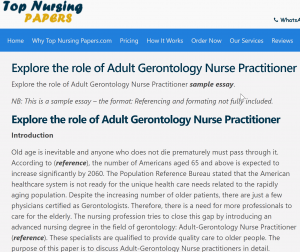Explore the role of Adult-Gerontology Nurse Practitioner
Introduction
Old age is inevitable and anyone who does not die prematurely must pass through it. According to (reference), the number of Americans aged 65 and above is expected to increase significantly by 2060. The Population Reference Bureau stated that the American healthcare system is not ready for the unique healthcare needs related to the rapidly aging population. Despite the increasing number of older patients, there are just a few physicians certified as Gerontologists. Therefore, there is a need for more professionals to care for the elderly. The nursing profession tries to close this gap by introducing an advanced nursing degree in the field of gerontology: Adult-Gerontology Nurse Practitioner (reference). These specialists are qualified to provide quality care to older people. The purpose of this paper is to discuss Adult-Gerontology Nurse practitioners in detail.
Who is an Adult-Gerontology Nurse Practitioner?
The word gerontology is referred to as the study of the aging process. Gerontology focuses on the causes and effects of age-related diseases in humans. Therefore, nurses who specialized in the field of gerontology are called Adult-Gerontology Nurse practitioners. These specialists focus on the care and treatment of adults (reference). An adult Gerontology Nurse Practitioner can also be defined as an advanced practice nurse with a clinical focus on treating people from adolescent to adult into advanced age. To be an Adult-Gerontology Nurse Practitioner, one must attain further specialized education following their certification as a registered nurse (RN) (reference). Adult-Gerontology Nurse Practitioners also study among other things, the biological aspects of aging such as the stiffening of the artery walls as well as the social, psychological, and physiological aspects of aging.
Are you looking for such an essay? Get nursing essay assignment help from the best nursing essay writers
Roles and Responsibilities of Adult-Gerontology Nurse Practitioners
Adult-Gerontology Nurse Practitioners provide a broad range of care. For example, they treat and prevent illnesses and address psychological, social, and cultural aspects of aging (reference). Gerontological nurse practitioners have attained a comprehensive approach to healthcare, hence, can deliver a care plan that patients understand and family members and caregivers are supportive of. The scope of practice for gerontological depends on an individual area of specialization (reference). Adult-Gerontology NPs can specialize in primary care or acute care. One should determine which path to take. However, their duties are not limited and are based on the needs of the patient 2. For instance, they may help patients with eating, dressing, bathing, and walking as well as working alongside a physician.
primary care or acute care. One should determine which path to take. However, their duties are not limited and are based on the needs of the patient 2. For instance, they may help patients with eating, dressing, bathing, and walking as well as working alongside a physician.
Adult-gerontology acute care nurse practitioners (AG-ACNP) care for patients in a hospital setting. The roles and responsibilities of AG-ACNPs include carrying out the diagnosis and developing treatment plans (Duquesne University, 2021). Others include stabilizing in critical care areas, performing procedures, and prescribing medications. They also analyze patients’ health histories and evaluate the effectiveness of a patient’s treatment plan. On the other hand, adult-gerontology primary care nurse practitioners (AG-PCNPs) are primarily concerned with preventive care and disease prevention (reference). Their duties include teaching patients and their families about how to maintain their health and prevent illness as well as how to help patients manage long-term health issues.
Also, read Description Of Nurse Practitioners Competencies
Important Skills for Adult-Gerontology Nurse Practitioners
Adult-gerontology nurse practitioners, across healthcare settings, have significantly improved the primary care of older adults. These nurses require particular leadership skills to ensure effective care services (reference). Adult-gerontology nurse practitioners (AGNPs) should have leadership skills to make them strong advocates for their patients. They must be good role models for providing quality care for the elderly. Gerontological nurses should h